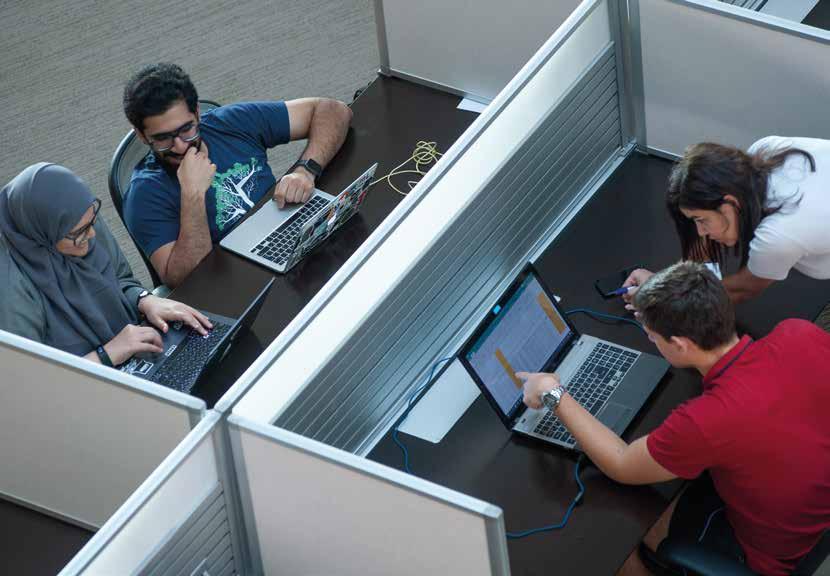
4 minute read
Pushing the Boundaries of Innovative
by KAUST
PUSHING THE BOUNDARIES OF INNOVATIVE EDUCATION
New programs and partnerships forge ahead despite pandemic-related disruptions
Advertisement
2020 has been a challenging year for universities around the world. Campuses have closed under lockdown measures and academics have had to adapt their teaching and research to new realities. Universities with flexible learning models have fared well, despite the circumstances. Very early on, KAUST’s Coronavirus Task force set guidelines for adapting classroom instruction to a virtual educational model. Its early response has reaped rewards, and despite ongoing global uncertainty regarding the pandemic, KAUST has been able to increase student enrollment while launching new educational programs and partnerships with overseas institutions.
Adapting Instruction During COVID-19
Despite the challenges and disruptions presented by the pandemic, KAUST’s student enrollment has risen to new heights. In the 2020/21 academic year, there was a 48% year-on-year increase in student enrollment, with the number of both international and local learners rising strongly. Most are based in KAUST residences, but more than one-quarter of new and existing students are learning remotely. KAUST’s ability to keep student enrollment up is testament to the university’s agility in adapting to remote learning set-ups. The university continues to push the boundaries to improve learner experiences and outcomes. The pandemic has created opportunities for KAUST to implement existing technology in previously unforeseen ways. While most teaching can be done online, the practical elements of lab work have been far more limited. The university is now looking at ways to implement virtual reality technology in the form of virtual labs, which would help facilitate the continuity of study for many KAUST students when being physically present on campus is not possible.
Strengthening Global Partnerships

KAUST PHD STUDENT
Khalil Moussi, PhD student in Electrical Engineering KAUST continues to strengthen its global partnerships and attract students and researchers from overseas, thereby staking its claim as one of the world’s leading research universities. The university has international partners in over 20 countries, with formal agreements that range from general memoranda of understanding to PhD dual degrees, visiting student research programs (VSRPs) and double degrees.
VSRPs are a key part of KAUST’s strategy to attract and retain international talent. The university has more than 15 VSRP agreements with international universities through which students from around the globe can attend workshops or conduct innovative research at the university over a three- to six-month period. KAUST has hosted almost 900 VSRP interns since 2014, and the program has continued – albeit through virtual internships – during the pandemic. Of the VSRP interns from the 2019/20 academic year, 59% went on to apply for regular degree programs.
New double-degree programs between KAUST and international institutions are also forging ahead, while adapting to the pandemic. In 2019, KAUST and Southern University of Science and Technology (SUSTech) in Shenzhen, China created a 3+2 Program that provides 20 eligible SUSTech students with the opportunity to obtain two degrees in a five-year period: a Bachelor’s degree from SUSTech and a Master’s degree from KAUST. Even though the first cohort of SUSTech students has been unable to travel to the Kingdom, they have already started their courses at KAUST virtually.
DR. TONY F. CHAN KAUST President
ENTREPRENEURSHIP IS THE NEW MATH. THE INNOVATION SKILLS LEARNED THROUGH THE PRACTICE OF DEVELOPING A START-UP AND COMMERCIALIZING RESEARCH STAY WITH STUDENTS THROUGHOUT THEIR CAREERS.
Training the Entrepreneurs of Tomorrow
The pandemic has not put the brakes on KAUST’s plans to develop innovative curricula for the leaders of tomorrow. In January 2020, KAUST’s Entrepreneurship Center launched its Entrepreneurship for All program, an intensive two-week course developed in conjunction with Stanford University’s Center of ARE INTERESTED IN
Professional Development and offered to all students.
The course is taught by KAUST, UC Berkeley and Cornell University faculty, and aims to teach students how to think like an entrepreneur and act like a leader. It combines interactive workshops on business, leadership and market, with the hands-on experience of taking an idea and turning it into a market-ready product. A second round of the course was successfully run onRESEARCH PROGRAM
line over the summer.
Entrepreneurship for All aligns with the university’s wider mandate to create an entrepreneurial ecosystem in the Kingdom by instilling all participants with a mix of creative thinking and practical skills that they can apply to their post-graduate edu-
M. GYÖNGYI MACIAS HONTI VSRP intern
IF YOU LOVE RESEARCH AND WORKING IN ONE OF THE BEST SCIENTIFIC ENVIRONMENTS IN THE WORLD, THE VISITING STUDENT cation and professional careers.
IS PERFECT FOR YOU. THERE IS NO OTHER PLACE LIKE KAUST.









